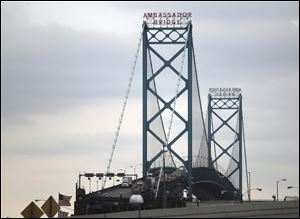
Gov. Snyder blames Washington for bridge delays
1/18/2014
The Ambassador Bridge.
DETROIT — Plans for a new bridge connecting the U.S. and Canada are moving more slowly than anticipated, partly because Washington doesn’t seem to want to pay for a customs plaza on the American side of the span, Michigan Gov. Rick Snyder said.
The bridge, one of Snyder’s most significant public projects since he took office in 2011, would compete with the privately owned Ambassador Bridge and take vehicles between Detroit and Windsor, Ontario.
The Canadian government, which believes another bridge would improve trade, has agreed to pay for most of it and recoup money later through tolls. But the U.S. needs to pay for a $250 million border inspection plaza.
“The U.S. government has largely taken a position that they don’t think they should pay anything for a facility for the United States government,” Snyder told the Detroit Free Press (http://on.freep.com/1fIOL9H ) in a report published Saturday.
He said there’s still time to solve the problem since land acquisition and design work must be completed first.
“In the meantime, I wouldn’t want to see the rest of the bridge held up over what you might describe as a somewhat difficult-to-understand attitude,” the governor said.
Snyder said inaction in Washington is “not totally inconsistent with other behavior out of Washington.”
There was no immediate comment from the U.S. Department of Homeland Security, which oversees U.S. Customs and Border Protection.
“There’s been no significant progress,” Roy Norton, Canada’s representative in Detroit, told the Free Press. “Engineering studies are virtually complete; land assembly on the Michigan side will get underway in 2014. ... But we can’t call for bidders until there’s a commitment to build the U.S. plaza.”
Ambassador Bridge owner Manuel “Matty” Moroun vigorously opposes the new bridge.
In addition to campaign donations and lobbying in Lansing and Washington, Moroun’s lawyers have filed lawsuits challenging the project in U.S. and Canadian courts.